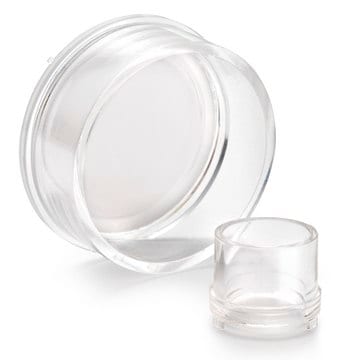AX15010TC
AXIS Axon Isolation Device, 150 µm
The AXIS Axon Isolation Devices have been shown to effectively isolate cell bodies from differentiating neurites for a variety of cell types.
Sinonimo/i:
AXIS Axon Investigation Platform
Autenticatiper visualizzare i prezzi riservati alla tua organizzazione & contrattuali
About This Item
Codice UNSPSC:
41104923
eCl@ss:
32011202
Prodotti consigliati
Materiali
polydimethylsiloxane (PDMS)
Produttore/marchio commerciale
AXIS
tecniche
cell based assay: suitable
cell culture | mammalian: suitable
Condizioni di spedizione
ambient
Descrizione generale
AXIS Axon Isolation Devices are tissue culture ready (TC) microfluidic tools that out-of-the-box enable researchers to easily isolate, observe, and test developing neurites. They are currently being offered in four different formats to provide test flexibility during investigation.
AX15010 consists of 10 units of AX150, an axon isolation device consisting of four wells, two channels, and a set of microgrooves. Two of the wells are interconnected by a channel on each side of the device. The microgrooves are located in the area between the two channels and their length is 150µm. Each microgroove is approximately 5µm in height by 10µm in width and are designed to allow neurite passage to traverse through while preventing cell bodies from flowing across the device. There are roughly 120 microgrooves in each AX150 device.
The AXIS Axon Isolation Devices have been shown to effectively isolate cell bodies from differentiating neurites for a variety of cell types (Taylor et al., 2005; Park et al., 2006; Liu et al., 2008; Yang, et al., 2009; Taylor et al., 2009) and will likely work with most neuronal cell type that can be successfully grown in tissue culture. Because the AXIS devices are made from an inert and non-toxic polymer, cultures grown within AXIS devices can be maintained for weeks at a time. (Chun et al., 1992; Shibayama et al., 1991). In addition, because the polymer used to fabricate the axon isolation devices is optically clear, cells cultured within the device can be imaged with high resolution microscopy, including live cell imaging, confocal, and differential interference microscopy (Taylor et al., 2005; Park et al., 2006; Liu et al., 2008; Yang, et al., 2009; Taylor et al., 2009).
The microfluidic design of the AXIS devices is highly conducive to generation of hydrostatic pressure, which can be selectively used to isolate a solution, as well as chemical targets of interest, on a designated side of the device (Park et al., 2006). In addition, immunocytochemistry (IHC) can also be performed within an AXIS Axon Isolation device and a protocol to do so is provided in the manual.
AX15010 consists of 10 units of AX150, an axon isolation device consisting of four wells, two channels, and a set of microgrooves. Two of the wells are interconnected by a channel on each side of the device. The microgrooves are located in the area between the two channels and their length is 150µm. Each microgroove is approximately 5µm in height by 10µm in width and are designed to allow neurite passage to traverse through while preventing cell bodies from flowing across the device. There are roughly 120 microgrooves in each AX150 device.
The AXIS Axon Isolation Devices have been shown to effectively isolate cell bodies from differentiating neurites for a variety of cell types (Taylor et al., 2005; Park et al., 2006; Liu et al., 2008; Yang, et al., 2009; Taylor et al., 2009) and will likely work with most neuronal cell type that can be successfully grown in tissue culture. Because the AXIS devices are made from an inert and non-toxic polymer, cultures grown within AXIS devices can be maintained for weeks at a time. (Chun et al., 1992; Shibayama et al., 1991). In addition, because the polymer used to fabricate the axon isolation devices is optically clear, cells cultured within the device can be imaged with high resolution microscopy, including live cell imaging, confocal, and differential interference microscopy (Taylor et al., 2005; Park et al., 2006; Liu et al., 2008; Yang, et al., 2009; Taylor et al., 2009).
The microfluidic design of the AXIS devices is highly conducive to generation of hydrostatic pressure, which can be selectively used to isolate a solution, as well as chemical targets of interest, on a designated side of the device (Park et al., 2006). In addition, immunocytochemistry (IHC) can also be performed within an AXIS Axon Isolation device and a protocol to do so is provided in the manual.
Qualità
Each unit is visually inspected to conform with internal specifications for channel width, length, and height.
Note legali
Certificati d'analisi (COA)
Cerca il Certificati d'analisi (COA) digitando il numero di lotto/batch corrispondente. I numeri di lotto o di batch sono stampati sull'etichetta dei prodotti dopo la parola ‘Lotto’ o ‘Batch’.
Possiedi già questo prodotto?
I documenti relativi ai prodotti acquistati recentemente sono disponibili nell’Archivio dei documenti.
Il team dei nostri ricercatori vanta grande esperienza in tutte le aree della ricerca quali Life Science, scienza dei materiali, sintesi chimica, cromatografia, discipline analitiche, ecc..
Contatta l'Assistenza Tecnica.





